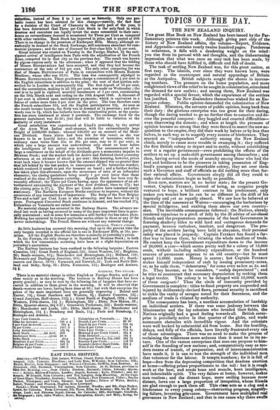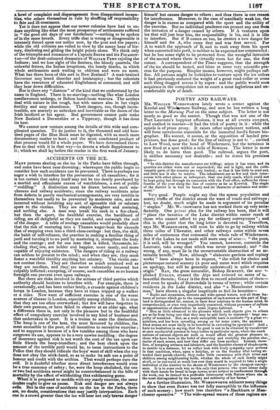TOPICS OF THE DAY.
THE NEW ZEALAND INQUIRY.
THE great Blue Book on New Zealand has been issued by the Par- liamentary printers this week. Although giving part only of the history of New Zealand affairs, the volume—Report, Evidence, and Appendix—contains nearly twelve hundred pages. Ponderous in substance, it falls with a deadening weight on the mind: you rise from its perusal with sad thoughts, and the disheartening impression that what was once an easy task has been made, by those who should have fulfilled it, difficult and full of doubt.
The task of settling New Zealand was, for this great nation, at
first easy. The islands, ever since they were known here, were regarded as the counterpart and natural appendage of Britain at the Antipodes. British subjects sought the shores in increas- ing numbers. The pressure on the home population, and more enlightened views of the relief to be sought in colonization, stimulated the demand for new outlets ; and among them, New Zealand was regarded with a special favour, which the experience of the settlers has justified. The New Zealanders themselves wished for an Eu- ropean colony. Publio opinion demanded the colonization of New Zealand. Ministers, the servants of public opinion, hung back from their duty : the glorious enterprise was too great for their daring, though the daring needed to go no further than to conceive and de- cree the peaceful conquest : they boggled and courted difficulties— even disavowing the domain ; and when at length the pressure of opinion became so strong that they were forced to assert the new ac- quisition to the empire, they did their work by halves or by less than halves, in such way as to magnify every source of hinderance. They erected an "independent" authority among the New Zealand chiefs, merely to cause more trouble in swamping it ; they suffered the first British colony to depart and to settle, without establishing over it a regular government—even prohibiting the efforts of the settlers to set up a makeshift government among themselves ; and then, having sowed the seeds of anarchy among those who had the
zeal and boldness to be the pioneers in taking possession of Eng- land's youngest and most remarkable colony, they set over them such a Governor and staff of officials as did nothing more than fur- ther embroil affairs. Government simply did all they could to make the colonization begin as badly as possible.
Even now, matters are in no better state ; for the present Go- vernor, Captain FITZROY, instead of being, as sanguine people ventured to hope, a brilliant contrast to his predecessor, only makes you wonder how he can be so different in the drift of his ingenuity and yet so equally absurd. We saw how he behaved at the time of the massacre at Wairau—encouraging the barbarians by special indulgence, and exalting them above our own country- men. The inevitable consequences followed: the Natives, already rendered rapacious to a pitch of folly by the ill advice of soi-disarat friends and the preposterous measures of the local Government in fostering shadowy titles to wild land and outrageous demands for payment, became turbulent, insolent, and dangerous. The pro- perty of the settlers having been held in abeyance, their personal safety was placed in jeopardy. Captain FITZROY has found a fur- ther way to harass them, by vitiating the whole medium of trade. He cannot keep the Government expenditure down to the income of 20,0001. a year—which seems pretty well for a colony of 15,000 souls, without including military expenditure, or the hundred sources of permanent expense to an old country—but he must spend 15,000/. more. Money is scarce; but Captain FITZROY makes himself independent of cash by issuing promissory-notes, or, as he calls them, " debentures," for sums even as low as 5s. and 2s. They become, as he considers, " unduly depreciated " ; and he tries to counteract that necessary depreciation by making them a legal tender. The colony is to be deluged with 15,0001. worth of these assignats ! Thus the circle of insecurity provided by Government is complete : titles to fixed property are suspended and injured by deliberately-devised flaws, personal security is sacrificed to tickle the vanity of savages noted for their fierceness, and the medium of trade is vitiated by authority. The consequence has been, a needless accumulation of hardship on individual settlers. If there was some jealousy between the Missionaries and the lay colonists who invaded their fields, the Natives originally had a good feeling towards all. British enter- prise is peculiarly active in that quarter of the globe, and trade surmounts obstacles with incredible vigour. And the colonists were well backed by substantial aid from home. But the hostility, delays, and folly of the officials, have literally frustrated every one of those advantages. There was no need to make the process of reclaiming the wilderness more arduous than it must be in its na- ture. One of the vastest enterprises that man can propose to him- self is the founding of new nations; and, comparatively easy as mo- dern means of transit, of preparation, and of intercommunication have made it, it is one to test the strength of the individual men that volunteer for the labour. It tempts numbers ; for it is full of hope—free from the depressing competition that deadens exertion at home—offering prizes proportionate to the toil : but it is rough work at the best, and needs bone and muscle, keen intelligence, and indomitable spirit. The very failure at home, however, makes men restless ; and the distant hope, more smiling because more distant, lures out a large proportion of incapables, whose friends are glad enough to pack them off. This class acts as a clog and a hinderance to every young colony—obstructing progress, magnify- ing failure, inventing grievance. Government have multiplied real grievances in New Zealand; and that is one cause why there swells
a howl of complaint and disparagement from disappointed incapa- bles, who solace themselves in ruin by shuffling off responsibility to fate and ill-treatment.
Yet it does not appear that our newer colonies have had to en- dure anything like what the most prosperous of settlements suffered in " the good old days of our forefathers "—nothing to be spoken of in the same breath. Every trifle that is wrong or disagreeable is intensely forced upon our notice now, by the post and the papers ; while the old colonies are veiled to view by the sunny haze of his- tory, disclosing and gilding the bright points alone. We think only of the triumphs and romances of a Captain SMITH and his PocAnost- TAS—of the drab-coloured dramatics of Wu-mem PENN cajoling the Indians ; and we lose sight of the famines, the bloody quarrels, the unlawful fetters, the Indian irruptions, the lonely deaths, in which whole settlements sank wailing to oblivion and were no more. What has there been of this sort in New Zealand ? A mad-brained Governor may breed disorder and bankruptcy ; but the colonists have the resources of educated Englishmen at command, and still they bear down difficulties.
Nor is there any "distress" of the kind that we understand by the name in England. There is no starving—nothing like what London needlewomen undergo, or Bolton hand-loom weavers. The settlers deal with nature in the rough, but with nature also in her virgin fertility and easy abundance. Their dangers, too, though incon- testible, are scarcely so unbroken and inevitable as the doom of the Irish landlord or his agent. Bad government cannot quite make New Zealand a Dorsetshire or a Tipperary, though it has done its best.
We cannot now venture among the details of this wide and com- plicated question. To do justice to it, the thousand and odd hun- dred pages of the Blue Book must be digested, with as much more documentary matter to boot ; and the most condensed product of that process would fill a whole paper. We have determined there- fore to deal with it in that way—to devote a whole Supplement to it ; which we shall lay before the reader in the first week of January.



























 Previous page
Previous page